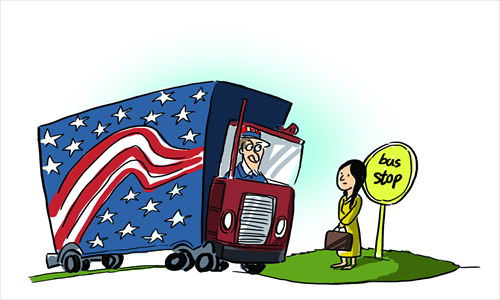US and Myanmar edge toward rapport

What triggers former foes to become friends and then listen to each other on their mutual interests is a puzzle for political scientists. But it's a process we see in the bilateral relations of the US and Myanmar.
Until a year ago, Myanmar faced sanctions and its former military generals were denied visas for the US. The dual-track policy of the Obama administration, which began in 2009, has gradually mended the once strained relations.
Myanmar President U Thein Sein's visit to the White House on Monday is a testament to improved relations. It is the first head of state visit to the White House in 47 years.
Thein Sein's visit comes less than a year after US President Barack Obama's visit to Myanmar last November, the first ever by a sitting US president.
The primary reason behind invitation is to show support for the ongoing democratic reforms and to discuss possible ways how Washington can help.
What have changed in the bilateral relations? There are a number of factors, but the most crucial ones are the release of political prisoners including Aung San Suu Kyi, the accommodation of the National League for Democracy and its elected representatives in the parliament, and the cessation of violence with most of the ethnic armed groups.
US-Myanmar relations in the past few years have been largely based on a quid pro quo strategy.
The Myanmar government has meticulously responded to the US demands for rapprochement. One example is on the issue of political prisoners.
In January and February 2012, on the anniversary of the country's Independence Day and Union Day, the Myanmar government released more than 600 political prisoners, including prominent student leaders of the 1988 democracy uprising and ethnic minority leaders.
In response, the US government decided to resume diplomatic relations at the ambassadorial level.
Another significant US response was the suspension of investment sanctions on July 11 and import bans on September 26, 2012. Those initiatives allowed international financial institutions such as the World Bank and the International Monetary Fund to reestablish their links with Myanmar.
Just ahead of Thein Sein's visit to Washington, the Myanmar government released at least 20 political prisoners on Friday. This is one reason why rights activists and democracy campaigners criticize the Thein Sein government for using prisoners as a pawn and for public relations purposes.
What are the US interests in Myanmar and vice versa?
The US interests can be summed up as economic, political and strategic. The permanent lifting of sanctions enables the US companies to invest in Myanmar, which in turn will economically benefit both countries.
Politically, the US wants to maintain its global leadership status as a champion of democracy and human rights. By inviting Thein Sein to the White House, the Obama administration shows its support for the reform initiatives of the Myanmar government and a commitment to help.
Strategically, Washington wants to reassert its presence in the region as it intends to build closer ties with Southeast Asian nations.
By strengthening ties with Myanmar, Washington also attempts to compete with and contain a rising China, which is Myanmar's biggest investor.
On the other hand, for Myanmar, normalizing relations with the US will not only attract investment companies, but also boost the bilateral trades, both in terms of imports and exports.
It will also help secure loans and other financial assistance from international institutions associated with the US.
Politically, the Myanmar government, still dominated by former generals, wants the support and recognition of the US, especially on the eve of assuming the chairmanship of the Association of Southeast Asia Nations in 2014.
Moreover, Thein Sein wants to prove to the military hard-liners in Myanmar, who are skeptical of the reforms, that he has the support of the international community.
Thein Sein's trip to Washington is a triumph of quip pro quo diplomacy pursued by both nations. Though uncertainties still remain in Myanmar, the visit shows Washington's approval of the ongoing reform process.
The author is general secretary of the US-based Kuki International Forum. opinion@globaltimes.com.cn